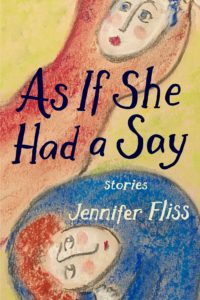 Review by Carla Panciera
Review by Carla Panciera
Samuel Taylor Coleridge long ago advised readers that, to fully appreciate the magical, the mysterious, the outlandish, we need to suspend our disbelief. That is solid advice for sitting down with Jennifer Fliss’s collection, As If She Had a Say. In these stories, characters create balloon animals at funerals; they give birth, but not to babies. One woman’s vagina projects movies. This is an imaginative journey through the very real struggles in the lives of Fliss’s characters. We may never have had a tiny woman living in our refrigerator or a tub drain clogged with sea creatures, but we have felt what these characters have felt: loss, loneliness, the effects of trauma, even the thrill of survival.
As the title implies, many of Fliss’s protagonists are unable to express themselves as in “This Warm and Breathing Thing,” where a woman has been called to the emergency room to await news of her husband who has been in an accident. She recalls the earlier, more promising days of their relationship and contrasts those with the most recent ones which are evidence of both the normal wear and tear of longterm relationships and something more foreboding. Although, in those more idealistic days, the couple had decided against having children, the wife has recently had a change of heart and broaches the subject with her spouse: “Talk and talk and talk, he said, as I went through our options and he flipped another page of his economics magazine. He said you just talk and talk and talk.” There are glimpses here of Kate Chopin, not only in the brevity of the stories throughout, but also in the implication that the news a doctor will eventually impart to this young wife might inspire a reaction that is full of ambiguity and a brutal kind of honesty.
When Fliss’s women can’t speak, they do any number of things. They bathe with all their clothes on. They melt. They collect paper punches and trail confetti hearts in their wake. In “The Space Where They Met,” a girl whose mother has abandoned her makes Venn diagrams because, she says, “Intangible things–things like feelings and hope–meet the tangible circles in a Venn Diagram, and in that space is where the answers to my questions are; I’m sure of it. I like making Venns. Trying to figure out answers.”
Sometimes, these women even allow themselves to be rescued, but only after their story has been told, as in “The Cresting Water,” where a young man tries to evacuate an elderly woman before a storm. First, though, he must listen to why she resists. It isn’t heroic action which saves us, Fliss’s characters seem to imply, but the simple act of being heard.
Though many of the stories in this collection are connected thematically and feature female protagonists, other stories deviate from this. In one story, a man discovers his paternity in a bizarre way. In “The Man Who Sold Hands,” a shopkeeper provides people with hands to assist them in things they are no longer able to do. In “Pieces of Her,” a widower treasures the few remaining strains of his wife’s hair that he has fished out of the drain. Though these and other stories work with transformation, they also distract from the book’s central idea of the desperate need to be heard, especially by women.
The concise and layered story, “Maude’s Cards and Humanity,” offers all that is strongest about the stories gathered here. Here are elements of the absurdist threads of Fliss’s work (a coffee shop patron explodes and his body’s detritus becomes artwork). Here too, is the protagonist’s attempt to cope with the loss of her sister, including a dreamlife that stars Aaron Burr as her lover. The humor is dark and subtle. The writing is brilliantly sparse and full of sharp details and the ending offers some redemption in both surprising and wonderfully ordinary ways.
Fliss captures the nature of loss, the ways in which we must navigate the unimaginable. Grief, like some of the situations here, is unimaginable, fantastic, completely self-altering. But as one of her characters reminds us, “The most important thing you can tell people, dead or alive, is that you are here. On this earth. To live what they could not or what they will not.” You just need someone who will listen to what you have to say.
As If She Had a Say by Jennifer Fliss
Curbstone Books/Northwestern University Press
$18.95 Paperback 978-0-8101-4625-9 July 2023
Carla Panciera’s collection of short stories, Bewildered, received AWP’s 2013 Grace Paley Short Fiction Award. She has also published two collections of poetry: One of the Cimalores (Cider Press Book Award) and No Day, No Dusk, No Love (Bordighera Poetry Award). Panciera’s newest book is, Barnflower: A Rhode Island Farm Memoir (Loom Press in 2023).
